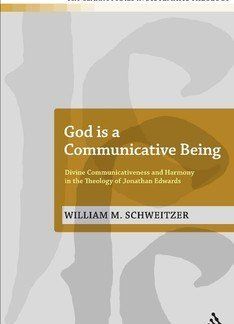William M. Schweitzer
T&T Clark
208, £60.00
ISBN: 978-0567195227
Star Rating: 5 Maximum
This book is based on theological research conducted by the author, before he became the church planting minister at Gateshead Presbyterian Church. In that, he is following in the footsteps of Edwards who was similarly committed to the church. We need pastor-theologians as frontline servants in the church of God.
The book’s main theme highlights an important aspect of Jonathan Edwards’ thought, best illustrated by a key Edwards quote: ‘The great and universal end of God’s creating the world was to communicate himself. God is a communicative being’ (p.11).
This concept pervades the whole book, as Schweitzer attempts to systematise Edwards’ theology around this theme. The starting point, rightly so, is the doctrine of the Trinity.
The first chapter, ‘The communicative God’, emphasises that the triune God has communicated himself in creation and redemption. You cannot fail to be impressed by the breadth of analysis with which Edwards treats every subject.
At times, you sense Edwards is overly speculative, and Schweitzer is not uncritical of him at certain points. In chapter 2, entitled ‘Nature’, Schweitzer highlights this capacity for wide-ranging thinking and shows that Edwards had a passion for science because it reflected the Creator (pp. 41-43).
In a western world hijacked by Darwinian theory, a fresh approach to the sciences by Christians is desperately needed, and not simply for apologetic reasons.
‘Special revelation’ and ‘Scripture’ are the next two chapters. Sadly, many Christians today seek God’s voice in the wrong places. The corrosive influence of Charismatic enthusiasms and the abounding confusion resulting from pursuing extra-biblical revelations bear testimony to this.
This book is refreshing in that it magnifies the truth that God is a communicative being and this communication is found only in holy Scripture, for the purposes of redemption. How we need a recovery of this dynamic principle in the church!
The vision presented by Edwards on divine providence expands our horizons. Chapter five handles ‘History’ as a significant key to Edwards’ thought. Schweitzer asserts that ‘Edwards was both a historian and a theologian of history’ (p. 141).
The final chapter, ‘Edwards’ project’, ties the various threads together. Ministers are to continue his ‘project’ as heralds of the gospel, communicating the harmonious message of the Trinity to a depraved world (pp. 148-154).
This book is highly recommended. It is readable, fresh, challenging and needed in our secular age. We eagerly await more materials on Jonathan Edwards from this author, ones hopefully written on a more popular and affordable level.
Kevin Bidwell
Sheffield





